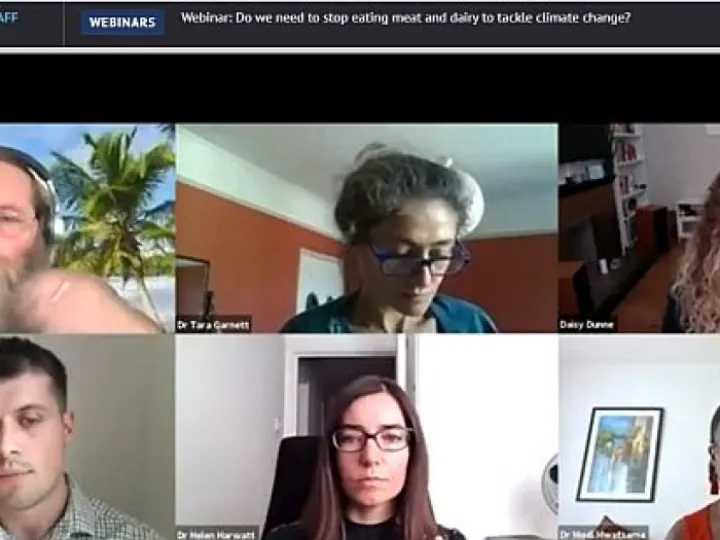Climate Change -Do We Need to Stop Eating Meat and Dairy?
Do we need to stop eating meat and dairy to tackle climate change?
On September 17th Nick Read, one of the Borderlands Chaplains attended an online webinar on the subject of meat production and climate change. His notes are attached, the full recording of the webinar is available on: https://www.carbonbrief.org/webinar-do-we-need-to-stop-eating-meat-and-dairy-to-tackle-climate-change
The webinar consisted of a panel of experts who gave brief presentations, followed by a question and answer session. The panel consisted of: Dr Modi Mwatsama, Senior Science lead for food systems, nutrition and health, Wellcome Trust, Dr Helen Harwatt, food and climate policy fellow Harvard Law School/senior research fellow Chatham House, Dr Tara Garnett, leader of the Food Climate Research Network and Prof Pete Smith, Chair of Plant & Soil Science, University of Aberdeen.
Pete Smith: Food production is responsible, globally, for 26% of the world's GHGs. Of this, animal production contributes 58% and within the 58% beef and lamb accounts for about half. Therefore, ruminant meat production has a high GHG equivalence for each kcal produced and between 10 to 100 times the impact compared to plant-based products. As a global norm, therefore, we should consume less meat and dairy.
Helen Harwatt. They have modelled what would happen if land was taken out of meat production and reverted to vegetational cover, and this would sequester a lot of carbon. If the world ate 70% less meat, the land reversion would lock up 9 years' worth of carbon produced.
Modi Mwatsama talked about the Eat Lancet Commission and a "planetary health diet" i.e. what would be an optimum diet for both human health and the environment. The general consensus is that we should reduce meat consumption by half, especially in developed economies, and double fruit and veg consumption. In the US and Europe, we eat more meat than is good for us and we are seeing the effects in food illnesses (approx. 33% are linked to animal sourced food) raised risk of colon cancer, heart disease and diabetes. Production methods can also pose risks such as respiratory illness, antimicrobial resistance and zoonotics. However, health impacts depend on the rest of the diet and lifestyle. Meat (up to 200g per week) can be part of a healthy diet and, in some poorer countries, meat and dairy are the essential sources of protein, but generally in the west we eat far more than is good for us.
Tara Garnett looked at the influences on diet, a complex web of culture, lifestyle, family, accessibility, affordability, trading patters etc. Nevertheless, we should reduce consumption of animal products and look at changes in food production.
Q&A Session
Q Is organically produced meat better?
A If looked at purely from a GHG perspective, probably not. It takes longer for the animal to reach maturity on a grass-fed system, so the GHG emissions per unit of meat over the lifetime of the animal will be higher. However, there are other issues to consider – landscape, biodiversity, animal welfare.
Denmark has developed an environmental impact label on food
Some countries have produced dietary guidelines for both human nutrition and environmental health. This was stopped in the US from becoming mandatory after lobbying from the meat trade.
It was noted that the UK Committee on Climate Change recommended a 20% reduction in meat production and consumption, though they noted that this was probably happening anyway.
Q Is laboratory grown meat better?
A It depends on the energy intensity of the process used and the initial cell stock still comes from animal sources. However, there is a bigger question, why are we simply substituting standard foods with similar products, rather than looking at our diets in the first place. We have made protein into a fetish and lab produced meat does not alter the power structure in the food chain – we are still dependent upon Corporates for our food supplies.
Q Should we all become vegan?
A Reducing meat consumption will help reduce GHG emissions but it doesn't have to be meat or no meat; less meat and reduced portions are also important. For some people, meat and dairy makes the difference between life and death. All food production has an impact and we need to ensure that what we are replacing meat with is also carbon neutral, Furthermore, changing diet cannot be about out-sourcing our animal production to other countries. There is the danger of the "halo effect", i.e. I've cracked my GHG emissions by going vegan, so I'm free to fly around the world.
Q What are the relative merits of different systems of livestock production?
A There is a debate about the relative merits of systems of livestock production. A degree of intensification often leads to higher welfare standards for livestock and more efficient production (i.e. lower GHG outputs per unit of product). This is the argument often quoted that UK livestock farming has a lower GHG footprint than many other countries – because we are more efficient. But there are other considerations as well. Continuing intensification can lead to deteriorating environmental conditions and ethical considerations about how animals are being kept. Over intensification can lead to welfare deterioration.
Grass-fed cattle have better standards of animal welfare but may not be as good w.r.t GHGs because of the time taken to reach maturity (more GHGs emitted per unit of output). However, there are other benefits in terms of landscape, recycling of nutrients etc. It is important to assess the multiple outcomes of any system of production. The debate needs to look at the context of consumption and production, not just through a single issue-lens. It must also be noted that any system of livestock production is likely to emit more GHGs than the production of plant-based products.
Q How to we achieve voluntary reductions in meat eating in the population?
A One of the actions must be to improve non-meat options, especially in ready meals. Less than a quarter of "ready meals" are meat and dairy free. Also improve cooking skills generally e.g. to cook pulses. There should also be price incentives. Almost all agricultural subsidies support livestock production and this needs to change.
Q What are the merits of "plant-based" meats e.g. veggie burgers
A The impacts depend on the ingredients being used and the amount of processing taking place e.g. added palm oil and salts are not conducive to a healthy diet and processing will have a carbon footprint. Also look at the context, if instead of eating sausages and chips and a high calorie drink you're eating veggie burger and chips and a high calorie drink, you're not actually improving the diet!
Carbon Brief is a UK based website designed to improve the understanding of climate change.
https://www.carbonbrief.org/


